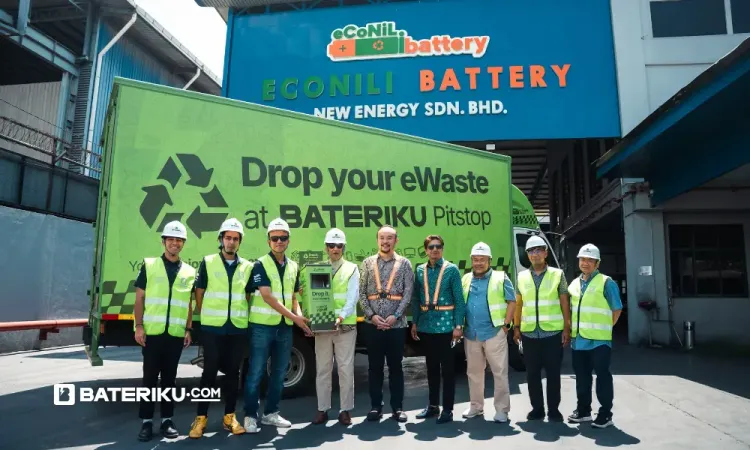In an era where sustainability is no longer a choice but a necessity, Bateriku and Econili Battery New Energy Sdn. Bhd. are stepping forward with a collaborative vision to transform how Malaysia handles lithium battery waste.
Through a recently signed Memorandum of Understanding (MoU), both companies have committed to building a circular battery ecosystem, aligning with Malaysia’s net-zero aspirations and global sustainability goals.
A Green Vision: From Roadside to Recycling
Bateriku, established in 2014 as an on-demand car battery replacement provider, has grown into a robust connected ecosystem. Today, the company operates over 220 Pitstops nationwide and serves a customer base exceeding 1.5 million car owners. Its ecosystem includes gig technicians known as BHeroes, local entrepreneurs (BPreneurs), and a vast network of BBuddy workshops and towing partners.
While Bateriku’s business has evolved to include roadside assistance and vehicle diagnostics, the company is now tackling the final piece of its service cycle responsible for battery disposal and recycling.
Introducing Briged Hijau
At the heart of this partnership lies Briged Hijau, a new nationwide initiative led by Bateriku to collect and responsibly recycle used lithium and lead-acid batteries. The program will leverage Bateriku’s network of Pitstops to collect e-waste, while Econili provides the licensed, high-tech processing capabilities to recycle, repurpose, or dispose of these materials.
With over 50,000 batteries supplied monthly, Bateriku handles a massive volume of spent batteries. The Brigade Hijau Lorry, unveiled during the MoU ceremony, symbolizes this new phase where a mobile force of trained teams will deliver sustainability, one battery at a time.
“We hope to become a dominant force in this space,” said Azarol Faizi, Group CEO of Bateriku.com. “Recycling is the final piece in our ecosystem. After serving more than 2 million customers and deploying 50,000+ batteries a month, Briged Hijau is our commitment to Malaysia’s green future.”

Econili: Innovating Responsible Recycling
Founded to tackle the growing challenges of battery and electronic waste, Econili Battery New Energy operates a fully licensed facility in Ipoh, Perak, capable of processing hazardous materials like lithium batteries (SW103), metal dross (SW104), and printed circuit boards (SW110). Econili’s plant is engineered to meet high environmental compliance standards while recovering valuable raw materials such as lithium, cobalt, and nickel.
“At Econili, we believe that innovation and sustainability go hand-in-hand,” said Mr. Jayden Goh, Founder and CEO of Econili. “Bateriku’s strength as a domestic partner with extensive reach at Pitstops across Malaysia makes this a remarkable moment to do something impactful for our country. We hope this partnership continues for 10, 15 years or even more.”
What Happens to the Batteries?
Through this partnership, batteries collected by Bateriku will go through three possible outcomes:
- Recycled – Materials like lithium and nickel are extracted and repurposed into new products, reducing reliance on virgin mining and preserving natural resources.
- Refurbished – Batteries with remaining life are restored for second-life applications such as solar energy storage or community donations.
- Responsibly Disposed – Non-reusable units are treated in accordance with Malaysian regulations and international environmental standards.
This comprehensive approach ensures that battery waste is not simply discarded but channeled back into the economy, creating a closed-loop system that benefits businesses, consumers, and the environment.

Supporting Malaysia’s Net-Zero and ESG Goals
The collaboration is timely and strategic. Malaysia’s Green Technology Master Plan and NETR emphasize the importance of private sector innovation in driving sustainability. At the same time, consumers and investors increasingly demand transparency and environmental responsibility from businesses.
The Environmental, Social, and Governance (ESG) component of this partnership is clear:
- Environmental: Reduction of e-waste entering landfills, responsible raw material recovery.
- Social: Community engagement, job creation in the green economy, and second-life battery donation programs.
- Governance: Transparent logistics tracking, data sharing, and quarterly performance reviews.
By formalizing this partnership, Bateriku and Econili offer a replicable model for other automotive and tech companies seeking to reduce their environmental impact.
Beyond the MoU: Roadmap for Future Growth
While the signed MoU serves as a non-binding agreement for now, it provides a strong framework for future collaboration. The agreement outlines intentions for:
- Coordinated e-waste logistics
- Second-life battery R&D
- Community awareness campaigns
- Formal commercialization of battery collection and processing
The MoU will remain in effect for two years, during which both companies will evaluate performance and expand on joint innovations.

A Milestone for Malaysia’s Circular Economy
This collaboration represents more than just corporate alignment. It is a national step forward in achieving circular economy outcomes. Malaysia currently faces increasing challenges in managing lithium battery waste, especially as electric vehicles (EVs) and consumer electronics continue to surge. Programs like Briged Hijau are essential in addressing these challenges head-on.
With Bateriku’s expansive service network and Econili’s technological expertise, the two organizations are uniquely positioned to influence national policy, build public awareness, and drive industrial innovation for a greener Malaysia.

